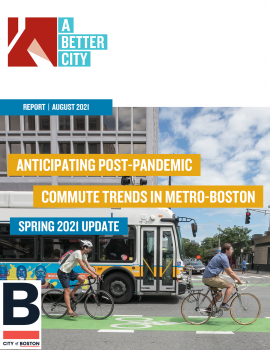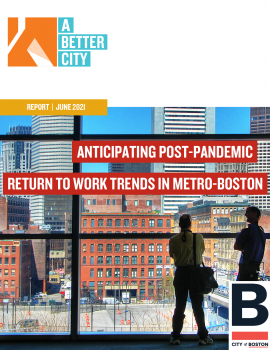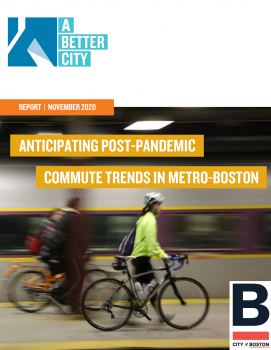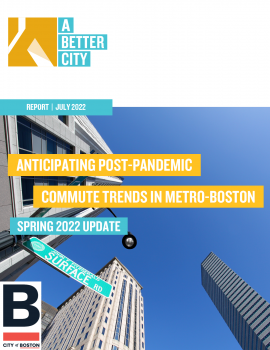Research
ANTICIPATING POST-PANDEMIC commute TRENDS REPORT SERIES
In partnership with the City of Boston’s Transportation Department (BTD) and with generous funding support from the Energy Foundation via the Bloomberg Philanthropies American Cities Climate Challenge, A Better City released a series of reports to forecast the “future of work” and commute patterns to better understand the impact of COVID-19 on the region.
July 2022 - As the COVID-19 pandemic enters calendar year three and many large companies who have relied on telework are beginning to announce their return to the office plans, A Better City, with collaboration from the City of Boston, has conducted a third iteration of the Boston Commuter Survey. This effort looks to provide a snapshot of commuter attitudes and perceptions at this critical time and draw clearer conclusions about what the future might hold for the metro-Boston region. These findings can help us work with our partners to explore and deliver innovative measures to support commuters and shift away from drive-alone behavior.
This collaborative effort of A Better City / City of Boston would not be possible without previous funding support from the Energy Foundation via the Bloomberg Philanthropies American Cities Climate Challenge.
 ANTICIPATING POST-PANDEMIC COMMUTE TRENDS IN METRO-BOSTON: AUGUST 2021
ANTICIPATING POST-PANDEMIC COMMUTE TRENDS IN METRO-BOSTON: AUGUST 2021August 2021 - As Metro-Boston navigated everyday uncertainty resulting from the COVID-19 pandemic over the course of 2020, residents and employees of the region watched bike lanes fill, highways empty, and transit services shift. With nearly 2/3 of Massachusetts residents vaccinated as of mid-July 2021, we have entered a critical moment for shaping the policies and objectives that will guide the next mobility trends in our region as we look toward a post-pandemic future.
As COVID-19 restrictions began to significantly lift at the end of Spring 2021, A Better City reached back out to the employee survey respondents and employer distribution partners we have collaborated with over the past year to revisit commute-focused survey questions posed in Summer 2020. In analyzing responses from over 2,650 commuters, we identified key takeaways and actionable recommendations for employers, the City of Boston, and the MBTA that build upon the results of our previous reports Anticipating Post-Pandemic Return to Work Trends in Metro-Boston and Anticipating Post-Pandemic Commute Trends in Metro-Boston.
This survey effort was made possible thanks to generous support from the Energy Foundation via the Bloomberg Philanthropies American Cities Climate Challenge.
 ANTICIPATING POST-PANDEMIC RETURN TO WORK TRENDS IN METRO-BOSTON: JULY 2021
ANTICIPATING POST-PANDEMIC RETURN TO WORK TRENDS IN METRO-BOSTON: JULY 2021
June 2021 - COVID-19 disrupted our lives and our regional economy in a way not seen in generations. The pandemic has also broadened our thinking about how we work and how we move around the region, highlighting the essential roles that public transit and public space play in the health of our citizens, vibrancy of our communities, and the strength of our economy.
A Better City conducted eleven interviews with member companies across six sectors in fall 2020 and winter 2021 to forecast, from the employer perspective, the ‘future of work’ and related commute patterns and to better understand how our individual and collective choices can shape the future. These interviews build upon the results of ‘Anticipating Post-Pandemic Commute Trends in Metro-Boston’— an employee-focused commute survey completed in September 2020 — and inform the key learnings and the recommendations included in this new report.
This interview effort was made possible thanks to generous support from the Energy Foundation via the Bloomberg Philanthropies American Cities Climate Challenge.
 ANTICIPATING POST-PANDEMIC COMMUTE TRENDS IN METRO-BOSTON: NOVEMBER 2020
ANTICIPATING POST-PANDEMIC COMMUTE TRENDS IN METRO-BOSTON: NOVEMBER 2020
November 2020 – As the COVID-19 pandemic has unfolded in metro-Boston, impacts upon daily commute patterns have been clear even to the most casual observer. News of a car-buying boom, the majority of business professionals working from home, widespread pop-up bike lanes, and sparsely populated subway cars have led to many questions in recent months about the future of transportation in the region. At the same time, the importance of meeting citywide goals to increase transit and bicycle riders to reduce carbon emissions has been dialed into even sharper focus. Against this backdrop, the City of Boston partnered with A Better City to survey over 4,200 employees in metro-Boston to better understand how COVID-19 has impacted commuting choices before, during, and in the anticipated future beyond the current pandemic. This survey effort was made possible thanks to generous support from the Energy Foundation via the Bloomberg Philanthropies American Cities Climate Challenge.
additional TDM RESEARCH & REPORTS
- August 2019 – Funding Transportation Solutions releases a transportation finance plan calling for a minimum of $50 billion in new investment over the next two decades to create the efficient, safe, and reliable system people and businesses deserve.
- February 2019 - An Update on Transportation Finance identifies a projected $8.4 billion gap in Massachusetts transportation funding requirements between 2019 and 2028 and points to the need for a long-term, comprehensive plan to raise new revenue for the system.
- December 2018 – The Future of Transportation presents an opportunity to shift the transportation conversation from its purely physical and operational dimensions to the role that transportation infrastructure can play in achieving a broader set of public goals.
- February 2018 - Transportation Dividend: Transit Investments and The Massachusetts Economy shows that the economic benefits of the MBTA far outweigh near-term capital needs and that our region’s levels of expected growth over the next quarter century cannot be accommodated without investing strategically and deliberately in transit.
- April 2016 – The Mobile Source Emissions Calculator helps the commercial real estate and business sectors understand how emissions from commuters, business fleets and business travel contribute to a facility’s overall greenhouse gas emissions. The compendium report describes the calculator, its goals, methodology, benefits and uses.
- October 2015 - Dynamic Ridesharing Technologies explores ways to better serve the transportation needs of seniors and people with disabilities by utilizing new ridesharing technologies in paratransit services, particularly the MBTA’s The RIDE.
- August 2015 - The Opportunities to Expand the Massachusetts Bay Transportation Authority’s Corporate Pass Program aims to increase by 10% the number of small and medium-sized businesses participating in the MBTA Corporate Pass Program.
- April 2015 - Unified Transportation Payment Media: Options for Massachusetts outlines possibilities for a unified payment system for transit services in the Commonwealth, enabling users to pay for transportation with their mobile phone or contactless credit/debit card.
- August 2014 - Establishing an Effective Commute Trip Reduction Policy in Massachusetts reviews best practices in Trip Reduction Ordinances in communities throughout U.S. This data can help to strengthen the Massachusetts DEP Rideshare Regulation and Boston’s Transportation Access Agreement Plans.




